I am beginning a new series dealing with the Top10 leading causes of deaths in the US. Together, these 10 causes account for 74% of all deaths in the United States and 25.5% for children.In this series I hope to bring hope that there are simple preventative methods, reversal strategies, along with recipes with ingredient awareness to help motivate improvement for your best life ever now.
We only have one life to live. Your best life can be now. Here’s how: find recipes below, ingredients analyzed for nutrient quality – all specific to help the heart.
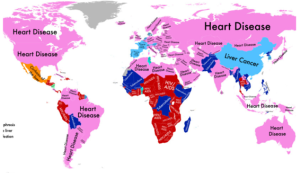
Heart Disease in the TOP10 worldwide:
- Cardiovascular disease, listed as the underlying cause of death, accounts for nearly 801,000 deaths in the US. That’s about 1 of every 3 deaths in the US.
- Coronary Heart Disease is the leading cause (45.1 percent) of deaths attributable to cardiovascular disease in the US, followed by stroke (16.5 percent), Heart Failure (8.5 percent), High Blood Pressure (9.1 percent), diseases of the arteries (3.2 percent), and other cardiovascular diseases
- Cardiovascular disease is the leading global cause of death, accounting for more than 17.3 million deaths per year in 2013, a number that is expected to grow to more than 23.6 million by 2030.
- Coronary heart disease accounts for 1 in 7 deaths in the US, killing over 360,000 people a year.
- About 790,000 people in the US have heart attacks each year. Of those, about 114,000 will die.
Heart disease is a term used to describe several conditions, many of which are related to plaque buildup in the walls of the arteries making it more difficult for blood to flow and creates a risk for heart attack or stroke. Although the death rate from heart disease has dropped nearly 70% and stroke nearly 80% and we’re dying less often because of the technological and pharmacological advances in modern medicine, we’re still getting cardiovascular disease just as often.
Even though there has been a decline in heart attacks, it remains in the TOP10 of Diseases.
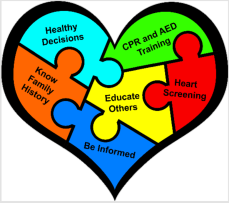
We only have one life to live, so we may as well treat our body as well as we can to live a strong and full life. Shouldn’t we want to be living the best life ever for ourselves and our loved ones and do those things we were created for? Your best life can be now if you make a few changes.
If you want a better future than the current, being on the brink of bypass surgery, needing a personal secretary gadget to keep track of your medications, or a living better through angioplasty. Don’t be a costly statistic. I encourage you to try one or more of the following tasty recipes.
Can a Heart Attack Be Prevented? Yes
Make Heart-Healthy Lifestyle Changes
Food variety – Don’t stick to the same few foods. The secret is the right types of food and variety. Add a bright colorful rainbow of foods.
Exercising – Your heart is a muscle, and it gets stronger and healthier if you lead an active life. It’s never too late to start exercising, and you don’t have to be an athlete.
Go hiking, bike riding, swimming, dance, laugh, take the stairs, park further away from your entrance
Taking a brisk walk for 30 minutes a day can make a big difference. You should still be able to talk to someone while you’re doing it. Otherwise, you are pushing too hard. You can divide your exercise routine into 10- or 15-minute segments. For motivation think about what you’d like to do and how fit you are.
Reward your self – Eat a piece of dark chocolate several times a week
Can the contents of your kitchen seriously save your life?
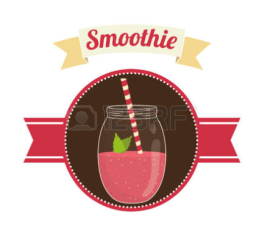 Try the following delicious smoothies. Also, discover the analyzed individualized nutrient quality of these recipes.
Try the following delicious smoothies. Also, discover the analyzed individualized nutrient quality of these recipes.
- Berry Smoothie
- Peach Smoothie
- Apple Pie Smoothie
- Ginger Pear Smoothie
- Coffee Cashew Smoothie
Here’s to your best life ever now!
Berry Smoothie
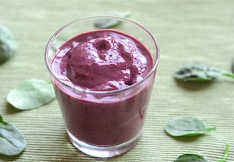 Ingredients
Ingredients
- 2 cups (8 ounces) frozen or fresh red berries, raspberries, strawberries, or a mix
- 3 cups (3 ounces) spinach (packed)
- 1 cup yogurt, kefir (extra probiotics), or a non-dairy alternative like almond milk
- 1 large banana, fresh or frozen
Preparation
- Put the berries and spinach in the blender first, and add the yogurt and banana. Process, scraping down as needed. Blend until smooth and serve.
Tips & Notes
If the smoothie is too thick to blend, add almond milk as needed to blend.
Ingredient Nutrients:
Berries –
-
- blueberries and strawberries are particularly rich in chemical compounds that lower blood pressure and make blood vessels more elastic.
- Raspberries have been shown to hold beneficial effects for people with a narrowing of the peripheral arteries to the legs, stomach, arms, and head.
Spinach –
-
- contains fiber, vitamins and minerals which can lower blood pressure and may reduce a build-up of plaque in the arteries.
- Potassium helps to ease tension in your blood vessel walls which lowers blood pressure. 50 to 80 percent of Americans are deficient in magnesium.
- Magnesium – Your heart has the highest magnesium requirement of any organ. It relaxes the muscles and also functions as an electrolyte. Without electrolytes such as magnesium, potassium and sodium, electrical signals cannot be sent or received, and without these signals, your heart cannot pump blood and your brain cannot function properly.
“[M]agnesium shines brightest in cardiovascular health. It alone can fulfill the role of many common cardiac medications: magnesium inhibits blood clots (like aspirin), thins the blood (like Coumadin), blocks calcium uptake (like calcium channel-blocking drugs such as Procardia) and relaxes blood vessels (like ACE inhibitors such as Vasotec)” The Weston A. Price Foundation
Greek yogurt – Probiotic “friendly bacteria” helps boost the immune system and promote a healthy digestive tract.
Almond Milk –
-
- It contains heart-healthy poly- and monounsaturated fats and is free from saturated fat, trans fats and dietary cholesterol. They can help lower your blood cholesterol levels.
Banana – has one of the highest potassium contents available.
-
- Potassium helps trigger the heart’s squeeze of blood throughout the body.
- Fiber is linked to a decreased risk for coronary heart disease. Fiber binds to cholesterol and bile acids in the intestine and promotes their excretion.
- Potassium is a mineral electrolyte that keeps electricity flowing throughout your body, which is required to keep your heart beating.
Peach
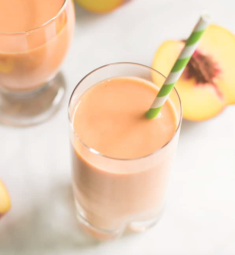 Ingredients:
Ingredients:
- 2 cups of peach
- 1 cup baby carrots
- 1 frozen banana
- 2 tbsp Greek yogurt (optional)
- 1 cup coconut milk, coconut water or water
- 1 tbsp honey (optional.
- (If peaches are very sweet there is no reason add honey)
Directions:
- In a blender, combine all ingredients together and blend until smooth. Blend for about 30 seconds.
- If you prefer you can strain the smoothie to make it even smoother.
Ingredient Nutrients:
Peaches – contain phenolic compounds that prevent the oxidation of low-density lipoprotein, or LDL, cholesterol.
Carrots – the orange hue comes from beta-carotene, a compound that serves as a source of heart-healthy vitamin A.
-
- Getting enough vitamin A helps fight heart disease, according to a review published in “Heart and Circulatory Physiology” in 2008.
-
- The Vitamin A in your system prevents hypertrophy, a harmful thickening of your ventricular walls.
-
- It also suppresses remodeling of your heart tissue in response to stress, a process that contributes to heart failure.
Coconut Milk –
-
- One of the best sources of lauric acid — 50 percent of the fat in coconuts is lauric acid, which has antibacterial and antiviral activities. According to many studies, lauric acid is a protective type of fatty acid linked with improved cholesterol levels and heart health.
- Coconut fat in the form of coconut milk does not cause a detrimental effect on the lipid profile in the general population, and in fact is beneficial due to the decrease in LDL and rise in HDL cholesterol.
- Contains minerals important for circulation and controlling blood flow.
- Magnesium may help combat stress and muscle tension while aiding in circulation and keeping muscles relaxed, important for preventing heart attacks.
- Following exercise, muscles also need plenty of nutrients — including electrolytes like magnesium and potassium that are found in coconut milk — to repair broken down tissue and grow back even stronger.
Apple Pie Smoothie
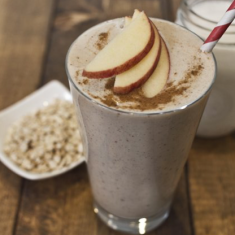 This liquid comfort food is good for you. The fiber from the oats and apple will hold you over until your next meal, while the ice keeps it nice and satisfying thick without adding calories.
This liquid comfort food is good for you. The fiber from the oats and apple will hold you over until your next meal, while the ice keeps it nice and satisfying thick without adding calories.
Ingredients:
- 1/2 cup organic rolled oats, soaked overnight in water and drained of excess liquid
- 1/2 teaspoon cinnamon
- 1/2 teaspoon nutmeg
- 1 tablespoon almond butter
- 1/2 apple, diced
- 1/2 cup unsweetened coconut milk (such as So Delicious Dairy Free)
- 1 cup ice cubes
- 1/2 cup water
Directions:
Combine all ingredients in a blender and blend until smooth.
Ingredient Nutrients:
Rolled Oats –
-
- Think of cardiovascular disease as a hardening of the circulatory system. Oats contain a specific type of fiber known as “beta-glucan”, a water-soluble fiber, partially dissolves in water and forms a thick, gel-like solution in the gut.
- It has been shown to reduce low density lipoproteins and raise the high density lipoproteins within the body.
- High fiber content in oats help remove cholesterol from the digestive system so that it does not end up in the blood stream. Soluble binds to cholesterol and bile acids in the intestine and promotes their excretion.
- A unique group of antioxidants almost solely found in oats may help lower blood pressure levels by increasing the production of nitric oxide. This gas molecule helps dilate blood vessels and leads to better blood flow.
- Naturally, a diet high in fiber and nutrients will help you avoid sticky, sluggish blood circulation.
Almond Butter – roughly 3.3 grams of fiber
A high-fat food that’s good for your health? That’s not an oxymoron. Almonds are high in monounsaturated fats, health-promoting fats which have been associated with reduced risk of heart disease.
-
- The fats it contains improves your blood cholesterol levels to combat cardiovascular disease.
- Fiber reduces your coronary heart disease risk by up to one-third.
- Insoluble fiber doesn’t dissolve in water, but passes directly through the digestive system pretty much intact. Insoluble fiber increases stool bulk, keeping bowel movements regular and eliminating constipation.
- Magnesium is Nature’s own calcium channel blocker. When there is enough magnesium around, veins and arteries breathe a sigh of relief and relax, which lessens resistance and improves the flow of blood, oxygen, and nutrients throughout the body.
- Potassium, an important electrolyte involved in nerve transmission and the contraction of all muscles including the heart, is another mineral that is essential for maintaining normal blood pressure and heart function. Almonds promote your cardiovascular health by providing 162 mg of potassium and only 0.2 mg of sodium, making almonds an especially good choice to in protecting against high blood pressure and atherosclerosis.
Apple –
-
- Contain compounds which act as antioxidants against LDL (low-density lipoproteins).
- Apples are also rich in pectines, which are soluble fibres which it has been demonstrated are effective in lowering cholesterol levels.
- Every 10 grams of fiber you eat, your risk for coronary heart disease drops by 14 percent—and fruit fiber was found to be especially protective.
- Vitamin C, bolsters the immune system, lowers BMIs, lower blood pressure, and lower levels of c-reactive protein (a marker of inflammation), all of which are linked to a lower risk for heart disease.
Cinnamon – In the TOP10 Herbs for heart help
-
- It’s anti-clotting function helps to keep the blood the proper thickness and stops the platelets from thickening the blood too much.
- It helps prevent oxidative stress of blood cells.
- It aids the body in flushing toxins from the body.
- It is also helpful in reducing high cholesterol levels in some people. It is rich in calcium, manganese and fiber. Calcium and fiber bind together bile salts and help with their excretion from the body. which prevents buildup of bile salts in the body. When bile is properly removed, the body makes fresh bile by breaking down cholesterol. This process reduces cholesterol levels and therefore prevents heart disease and atherosclerosis. Researchers have concluded that the health benefits of cinnamon’s compounds make cinnamon one of the most beneficial spices on earth.
- It increases blood circulation and advances bodily tissue’s ability to repair itself after it’s been damaged. This includes heart tissue which is in need of regeneration in order to fight heart attacks, heart disease, and stroke.
Nutmeg –
It helps to reduce high levels of cholesterol and triglycerides from the blood. This helps to reduce the risk of heart disease and stroke.
Coffee Cashew Smoothie
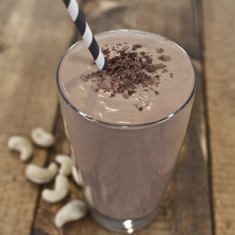 The creamy texture in this decadent drink comes courtesy of the cashews, which also add 5 grams of protein to help keep your blood sugar—and hunger—steady.
The creamy texture in this decadent drink comes courtesy of the cashews, which also add 5 grams of protein to help keep your blood sugar—and hunger—steady.
Ingredients:
- 1/4 cup cashews, soaked six hours or overnight
- 1/2 banana, peeled and chopped (frozen optional)
- 1 tablespoon cacao nibs
- 1/2 cup Ice
- 1/4 cup cooled coffee
- 1 cup unsweetened almond milk
- 1/2 tablespoon coconut sugar (optional)
Directions:
Combine all ingredients in a blender and blend until smooth.
Ingredient Nutrient:
Cashews –
-
- Helps lower LDL and increase the carrying capacity for HDL. HDL is responsible to absorb the cholesterol from the heart and take it to the liver where it can be broken down.
- It has fiber that helps lower your cholesterol.
- Helps improve the health of your artery walls by making them more flexible and less prone to blood clots that can block blood flow.
- Bad cholesterol foods: Dr. Axe.
Cacao nibs (chocolate) – means heart blood
-
- Magnesium helps maintain muscle and nerve function
- Antioxidants reduce risk of coronary disease and stroke
- Lowers blood pressure, improving vascular function, and reducing clotting and sticky platelets.
- Helps fight the free radicals that cause damage.
Coffee – “Is coffee good for you?” Yes and No
-
- Genetically, some people are metabolically fast at breaking down caffeine, others metabolize it more slowly. How quickly you metabolize coffee may affect your health risk.
- Opens blood vessels and reduces harmful inflammation, caffeine may create favorable conditions for good heart health.
- High in Antioxidants it can really help to slow the aging process.
- It is being added to the ever-growing list that drinking coffee could reduce the risk of clogged arteries, which can lead to heart attacks.
- Calcium deposits in their coronary arteries in the blood can keep moving along with modest coffee consumption. (The coronary arteries are the vessels that bring oxygenated blood to the heart muscle itself.)
- NOTE1: for Every cup of coffee you should drink 3 cups of water due to its diabetic nature.
- NOTE2: Coffee contains a cholesterol-raising compound called diterpenes (potential therapy for cardiovascular diseases), but the concentration of this compound depends on how the coffee is prepared. Boiled coffee has a higher concentration of diterpenes, which can increase total cholesterol and “bad” cholesterol levels. Filtered coffee, however, has no effect on cholesterol levels.
- NOTE3: There are many variables like exercise, smoking, etc. that complicate how coffee affects a person.
Ginger Pear Smoothie
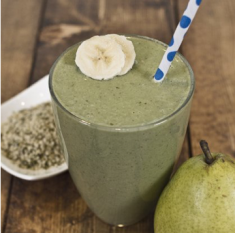 “This shake is ideal for recovery from an injury or extended-duration workout,” Brazier says. In addition to anti-inflammatory ginger, the flax and hemp contain alpha linolenic acid, an omega 3 that also combats inflammation.
“This shake is ideal for recovery from an injury or extended-duration workout,” Brazier says. In addition to anti-inflammatory ginger, the flax and hemp contain alpha linolenic acid, an omega 3 that also combats inflammation.
Inflammation is one of the primary predictors of coronary artery disease… not cholesterol.
Ingredients:
- 1 cup water
- 1 tablespoon ground flaxseed
- 1/2 tablespoon hemp seeds
- 2 tablespoon chopped fresh ginger
- 1/4 cup unsweetened almond milk
- 1/2 banana
- 1/2 pear
- 1 cup spinach
Directions:
Combine all ingredients in a blender and blend until smooth.
Flaxseed – rich source of omega 3 fatty acids and fiber.
-
- It can retard the progression of atherosclerotic plaques.
- It binds to bile acids and pull them out of the body.
Hemp Seed – Hemp seeds contain over 30% of good fat.
-
- They are exceptionally rich in two essential fatty acids, linoleic acid (omega-6) and alpha-linolenic acid (omega-3) linked with reduced inflammation.
Almond milk –
-
- Helps in reducing and maintaining blood pressure.
- Guarantees the presence of potassium in the body which is a key element that acts as a vasodilator and reduces tension and strain on the heart.
- High in omega-3 fatty acids to help lower your levels of “bad” LDL cholesterol and protect your heart.
- Contains riboflavin, a form of vitamin B that has been proven to work in conjunction with other nutrients like iron to regulate muscle strength. Your heart is a muscle.
Ginger: The Spice of Life…In the TOP10 herbs for heart health
-
- Ginger has been used medically for decades to treat a variety of cardiovascular conditions, including blood clots and high cholesterol.
- It contains anti-inflammatory properties by inhibiting and reducing inflammation and in the first place.
- It has the ability to neutralize free radicals
People with low blood pressure or who are already on blood pressure medications can experience an unsafe drop in blood pressure or heartbeat irregularities when taking ginger, which can also interact with other medications, including blood thinners.
Cholesterol is not the demon it is made out to be. In fact, it is a necessary raw material made by your liver, brain, and virtually every cell in your body, and without it you’d die. Outside cholesterol sources are what you want to watch out for.
Cholesterol: A Building Block, Not Road Block. Cholesterol needs a “shuttle” a special protein to help it navigate through your bloodstream to where it’s needed called LDL (or low density lipoprotein). Where is it needed? Cholesterol is like the internal bandage for your arteries and veins covering those lesions and internal sores. HDL (or high density lipoprotein) then comes in like a garbage collector, scoops up the processed or unused cholesterol, coats it in another special protein to prepare it for transport, and zips it back to your liver where it’s either recycled into new cholesterol or excreted from your body. When LDL that mutates, this is when you have problems. Free radicals “steal” your body’s built-in coping mechanism that automatically rebalances these free radicals. Free radicals are toxic lifestyle choices of consuming foods high in sugar, trans fats, emotional stress, smoking, lack of exercise, and much more.
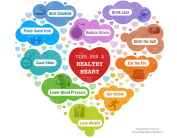
Remember that there are no magic bullets when it comes to health. To change your health for good, including overcoming cardiovascular disease, you need to permanently change your lifestyle for the better, including eating nutrient-rich whole foods and getting moderate daily exercise.
Other heart healthy foods:
- Eat 15 cherries a day – work to lower levels of uric acid in blood
- Eat one cup of beans per day (always soak your beans) – 300 micrograms folate slashed their risk of stroke 20 percent and their risk of heart disease 13 percent more than those who got less than 136 mcg per day of the B vitamin.
- Radish
- Asparagus
- Pear
- Red Grapes – keep platelets in your blood from sticking together
- Walnut – raises your “good” HDL cholesterol
- Unsalted almond butter – instead of using hydrogenated nut butter brands that filled with trans fats.
- Walnuts Walnuts are also one of the healthiest foods for diabetics.
Other heart healthy spices:
- Turmeric/Curcumin a Heart-Healing Spice
- Garlic – slows the buildup of plaque in your arteries, lowering your risk of blood clots.
- Cayenne’s Herbal Healing Benefits
- Capsaicin Circulation Increasing Effects
- Rosemary’s Cancer Preventive Potential
- Cilantro Can Lower Cardiovascular Risks
Please do let me know if you try one or more and how you like them and what you favorite is.
 http://www.prevention.com/health/health-concerns/best-foods-for-heart-health/slide/14
http://www.prevention.com/health/health-concerns/best-foods-for-heart-health/slide/14- http://www.webmd.boots.com/heart-disease/features/superfoods-for-your-heart?page=2
- http://articles.mercola.com/sites/articles/archive/2016/07/25/magnesium-for-heart-health.aspx
- http://healthyeating.sfgate.com/carrots-heart-7491.html
- https://draxe.com/health-benefits-cinnamon/
- https://www.drsinatra.com/dr-sinatras-top-healing-herbs-and-spices
- http://www.whfoods.com/genpage.php?tname=nutrient&dbid=59
- http://strongertogether.coop/recipes/hidden-spinach-berry-smoothie
- http://www.primaverakitchen.com/peach-carrot-smoothie-recipe/
- http://www.shape.com/healthy-eating/healthy-drinks/6-satisfying-vegan-smoothies
- http://www.shape.com/healthy-eating/healthy-drinks/6-satisfying-vegan-smoothies



11 thoughts on “TOP 10 Diseases & Conditions Part 1 of 10: Heart Disease – Heart Matters”